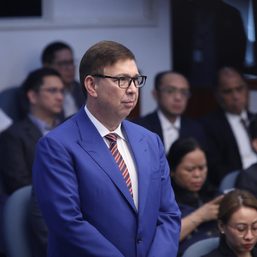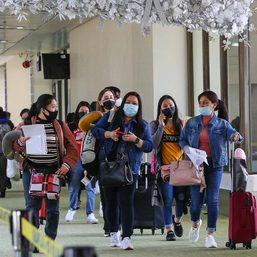SUMMARY
This is AI generated summarization, which may have errors. For context, always refer to the full article.

MANILA, Philippines – Finance Secretary Ralph Recto took his oath of office as the government sector representative to the Monetary Board (MB), the powerful seven-member group that steers the country’s monetary policy.
Recto took his oath on Monday, January 22, in a ceremony administered by Bangko Sentral ng Pilipinas (BSP) Governor Eli Remolona Jr.
The finance secretary, whose appointment to the Cabinet was announced on January 11, is the latest and final addition to the board. Benjamin Diokno, a former BSP governor and the finance secretary before Recto, also joined the MB days earlier on Tuesday, January 16.
From left to right in the image below, the Monetary Board now includes:
- Romeo Bernardo, sitting as a private sector representative
- Anita Aquino, sitting as a private sector representative
- Former finance secretary and BSP governor Benjamin Diokno, sitting as a private sector representative
- BSP Governor Eli Remolona Jr., sitting as chairperson
- Finance Secretary Ralph Recto, sitting as the government sector representative
- Bruce Tolentino, sitting as a private sector representative
- Former treasurer of the Philippines Rosalia de Leon, sitting as a private sector representative

Before Monday’s official announcement, BSP officials were hesitant to confirm that Recto would sit as the government sector representative on the MB. Although a finance secretary often takes the seat of the government representative on the board, officials pointed out this wasn’t a hard rule. For instance, BSP officials said, secretaries from the Department of Trade and Industry and the National Economic and Development Authority have served as the board’s government representative in the past.
“For now, there’s an appointed secretary of finance but me personally, I’m not sure if the secretary of finance will sit as a member of the Monetary Board because the provision says representative from the government,” BSP Deputy Governor of the Corporate Services Sector Eduardo Bobier said during a media information session on Friday, January 19.
Recto’s own appointment as finance secretary was preceded by months of rumors that Diokno was on his way out of the Cabinet. (READ: LIST: Signs that Recto was replacing Diokno as finance chief)
Now, his current seat at the MB comes with the responsibility of helping steer the country’s monetary policy and supervising its financial institutions. This includes raising, lowering, or maintaining its key policy rate in a bid to limit inflation.
The position also comes with a fat purse. MB members are consistently among the highest-paid officials in the government every year. In 2022, the list of top paid officials was dominated by MB members, such as then-BSP governor Felipe Medalla (P34.172 million) and Diokno (P28.781 million), as well as Anita Aquino (P26.362 million), Bruce Tolentino (P25.679 million), Peter Favila (P24.389 million), and Antonio Abacan Jr. (P24.026 million). – Rappler.com
Add a comment
How does this make you feel?


![[In This Economy] Is the Marcos government unlawfully dipping into PhilHealth funds?](https://www.rappler.com/tachyon/2024/07/marcos-government-philhealth-funds-july-12-2024.jpg?resize=257%2C257&crop=425px%2C0px%2C1080px%2C1080px)


There are no comments yet. Add your comment to start the conversation.